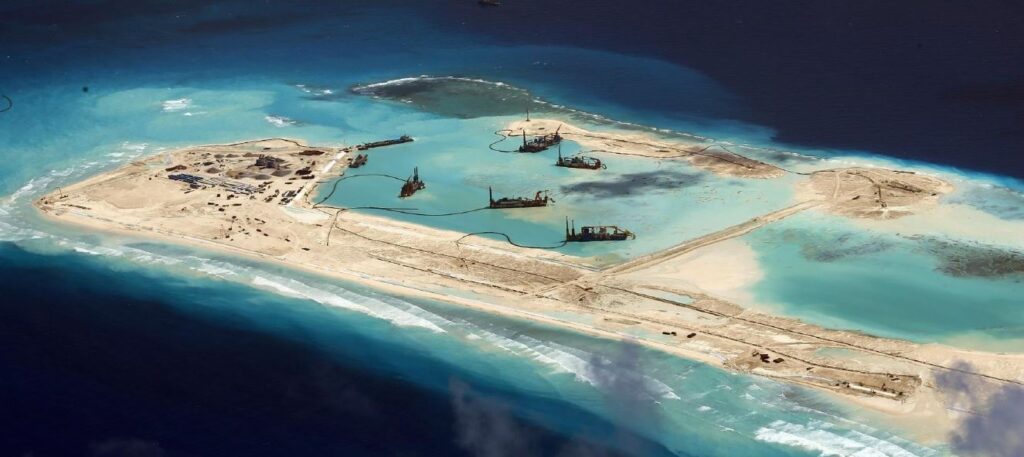
Chinese artificial island in the South China Sea
WASHINGTON: A top US diplomat today urged allies to reject electing a Chinese official to sit on the International Tribunal on the Law of the Sea, likening it to “hiring an arsonist to help run the fire department.”
The remarks by David Stilwell, the State Department’s assistant secretary for the Bureau of East Asian and Pacific Affairs (and a retired Air Force general), came a day after the US formally rejected most of China’s expanse territorial claims in the South China Sea, marking a significant new chapter in the worsening relations between the two superpowers.
Beijing has not only laid claim to practically all of the 1.3 million square mile South China Sea — putting it at odd with most of its neighbors. It has built runways and placed rocket batteries on several islands also claimed by neighboring countries like the Philippines, Vietnam, Malaysia, Indonesia, Brunei, and Taiwan. The US on Monday called Beijing’s claims “completely unlawful.”
Appearing on an online event hosted by CSIS, Stilwell said the US would “urge all countries involved in the upcoming International Tribunal election to carefully assess the credentials of the PRC candidate and consider whether a PRC judge on the Tribunal will help or hinder international maritime law. Given Beijing’s record, the answer should be clear.”
The Chinese Embassy in Washington pushed back against the State Department criticism, calling the US accusations “completely unjustified,” and accusing Washington of “flexing muscles, stirring up tension and inciting confrontation in the region.”
In his remarks, Stilwell denied suggestions that the US policy outlined Monday was a departure from Washington’s previous stance on China and its claims in the South China Sea.
Instead, “I would say primarily that we are no longer silent” on the matter of Chinese encroachment on islands claimed by other countries in the region. “We acknowledged it but we didn’t actually make any policy statements or adjustments. What has changed is the US has made a more active statement about what this actually means on specific maritime claims.”
What Washington wants to support more vocally is the July 2016 ruling by the U.N. Convention on the Law of the Sea Arbitration Tribunal, which ruled against China by holding the Scarborough Shoals belonged to the Philippines, giving China no rights to the small islands and outcroppings. Beijing has ignored the decision, and Stilwell said “we’re no longer going to say we’re neutral” in these matters.
It’s not clear what this means for American policy going forward, but the US currently has two aircraft carriers operating in the South China Sea and has ramped up its naval activities in the region.
China has also kept up its activities. Last month, the PLA Navy warned ships away from the Paracel Islands as it prepared to conduct four days of military exercises there, making the announcement one day after the US Navy sent two aircraft carriers into the Philippine Sea, and regional governments criticized Beijing’s island grab. The Chinese have no legal claim to the area.
The warning came just a day after regional leaders backed up complaints by Vietnam that China has encroached on areas within its influence, issuing a statement saying they “reaffirmed that the 1982 [United Nations Convention for the Law of the Sea] is the basis for determining maritime entitlements, sovereign rights, jurisdiction and legitimate interests over maritime zones,” an ASEAN statement said.
The rare rebuke of Beijing by its smaller neighbors came as a surprise to many, but is tangible evidence of a growing wariness of Chinese actions across the globe. On Monday, the UK banned Huawei from its 5G telecom network, reversing a January decision to allow the Chinese tech company to play a role in building the country’s new wireless infrastructure.
In May, two Navy ships sailed into the middle of a simmering dispute between China and Malaysia in the South China Sea, shrugging off a shadowing Chinese warship in an attempt to uphold the norms of transiting in international waters. The Littoral Combat Ship USS Montgomery and supply ship USNS Cesar Chavez sailed close to the Malaysian drillship West Capella, signalling their support against Chinese warships who have spent weeks harassing the commercial vessel looking for oil deposits.
Just days before the maneuver, Secretary of Defense Mark Esper told reporters at the Pentagon the US continues to see “aggressive behavior” by the PLA Navy in the South China Sea, from threatening a Philippine navy ship to sinking a Vietnamese fishing boat, and intimidating other nations from engaging in offshore oil development.
Stilwell today sought to tie actions in the South China Sea to a wider global effort by Beijing to intimidate other nations, claiming Beijing’s actions “pose the greatest threat to freedom of the seas anywhere on the planet. South China Sea issues have direct bearing on the future of the Arctic, the Indian Ocean, the Mediterranean, and other vital waterways.”

